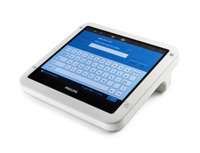 Equipped to increase quality of care
Equipped to increase quality of care
The Philips MCA brings a number of technology features together into a single platform, including an easy to read 10.4 inch XGA touch-screen, RFID and barcode scanning, Bluetooth, wireless LAN connectivity and a digital camera. The portable, always connected device is designed to require minimal training and provides significant benefits to the clinical users, helping to reduce medication errors, positively identify staff and patients, fill out charts, capture vital signs, write up reports and validate blood transfusions as well as the ability to closely monitor the healing of wounds.
Designed by clinicians for clinicians
"Nurses are already busy enough today and every little step you can save is very important to them," said Franco Martegani, CEO of Philips FIMI a global provider of medical displays and mobile point-of-care terminals. "The MCA embodies our brand promiseSense and Simplicity. It marries technology with usability and is designed around the way healthcare professionals are working when visiting patients, giving it the potential to provide more real-time care for a better patient experience."
The overall concept of the MCA has been defined by studying different usage models, with direct input from clinical staff. Individual components in the Philips MCA have been optimally tuned to each other to ensure the highest level of usability and portability. The MCA is made of lightweight material and provides an ergonomic fit for both right- and left-hand users. The device is also being designed to minimize fatigue while holding it flat thanks to a ground-breaking hand grip on the back of the unit, and features intuitive function controls, LED indicators and other smart interfaces that are suitable for use in many different fast-paced clinical situations.
Designed as a fully sealed device without any unnecessary I/O ports, the MCA can easily be wiped clean with disinfectant to reduce the spread of infection as nurses move from patient to patient. Moreover, its durable design makes the MCA suitable to withstand knocks, drops and the general daily activities within the hospital. Its medical grade compliance allows usage in many clinical areas, including intensive care units and surgery theatres.
The Philips MCA also comes with a revolutionary feature to swap the long-life battery with a fresh one in the docking station without disrupting applications currently in use. The grab and go docking station has been designed not only to charge the device but also to use it as a back-office desktop device in combination with a mouse, keyboard and high-speed Ethernet connection.
Sharing a common vision
Martegani concludes by adding that "Philips fully shares Intel's healthcare vision and we are delighted to collaborate with them on the creation of this new product category. Our market experience with the current ProScribe (12.1 inch) mobile point-of-care terminal confirms the growing demand for integrated and mobile solutions. Both products are complementing each other and offer care providers freedom of choice to deploy the right solution for the appropriate usage model."
"Intel is very pleased to be working with Philips FIMI to bring Intel's Mobile Clinical Assistant platform to market to address the challenges of todays healthcare system," said Patricia Perry, vice president of Intel's Digital Health Group and general manager of Healthcare IT. "The MCA, designed for and with clinicians, allows nurses to access up-to-the-minute patient records and to document a patient's condition in real time, enhancing care while reducing the administrative workload of the clinical staff."
The MCA category has the support of a number of leading healthcare software vendors, who are optimizing their software interfaces to take advantage of the product features delivered to the user by the platform. This demonstrates a broad commitment from the ecosystem to the category.
About Royal Philips Electronics
Royal Philips Electronics of the Netherlands (NYSE: PHG, AEX: PHI) is a global leader in healthcare, lifestyle and technology, delivering products, services and solutions through the brand promise of "sense and simplicity". Headquartered in the Netherlands, Philips employs approximately 121,700 employees in more than 60 countries worldwide. With sales of USD 34 billion (EUR 27 billion) in 2006, the company is a market leader in medical diagnostic imaging and patient monitoring systems, energy efficient lighting solutions, personal care and home appliances, as well as consumer electronics. News from Philips is located at www.philips.com/newscenter.